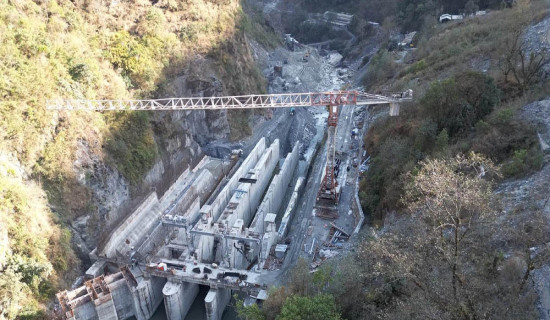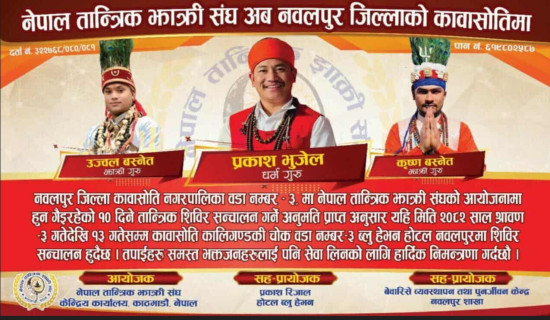- Saturday, 19 July 2025
Nepali Soul In Verse
“Soche Jasto Hunna Jiwan
Samjhe Jasto Hunna Jiwan
Jasto Bhogyo Ustai Hunchha
Dekhe Jasto Hunna Jiwan………”
These beautiful lines were penned by Dinesh Adhikari long ago—destined to leave a lasting impact on the Nepali music industry—alongside the marvellous voice of Tara Devi and the timeless melodies of Nati Kaji, two of the most celebrated names in Nepali music.
Dinesh Adhikari is a distinguished figures in Nepali literature, renowned for his prolific work that spans more than five decades. His lyrical compositions and thought-provoking poems often centre on the lives of the underprivileged, though many are also crafted purely for entertainment. Throughout his illustrious career, Adhikari has received more than two dozen prestigious awards, including the Madan Puraskar, and has garnered widespread recognition among Nepali-speaking communities across the globe.
Among the many songs that showcase his lyrical brilliance are Yo Samjhane Man Chha by Narayan Gopal, Soche Jasto Hunna Jiwan by Tara Devi, Timi Jun Rahale by Narayan Gopal, Kahile Chhaya Sanga Khase by Ram Krishna Dhakal, Pahad Ma Jado Badhe by Swoorup Raj Acharya, Raksi Beche–Alu Beche by Sharmila Bardewa, Pani Pani Bhayo Mero Man Pani by Nalina Chitrakar, and Bhetne Haru Chhan by Nisha Deshar. The list could go on—his contributions are countless.
Recently, Nepalaya released Pani Ko Pared, a collection of 77 carefully selected poems spanning seven themes, written by Dinesh from 2007 to 2023. The poems in Pani Ko Pared can be interpreted from various angles, but a sociological lens offers a particularly relevant approach. Through his verses, readers can explore the shifting dynamics of society, politics, economy, environment, and more.
In Pani Ko Pared, Dinesh captures the essence of the Eastern world, contrasting it with the Western perspective that values Nepali social institutions for their deep-rooted connections to family. He observes how modernity is gradually distancing younger generations from their elders, thereby disrupting traditional family structures. Dinesh critiques his relationship with society, politics, and those around him, offering poignant reflections in works such as Bakra Barsha (pg. 57-83) and Satta (pg. 74), where he condemns the manipulation of truth by political forces.
Many of Dinesh's poems explore the impact of modernisation on Nepali family ties (Hajurba, pg. 32) and solidarity (Asthako Akash, pg. 29-54). He critiques the role of contemporary politics in exacerbating corruption and hindering human development, reflected in his dissatisfaction with the low Human Development Index.
Gender and social inclusion are central to Dinesh's works. In the poem Euta Arko Balatkar (pg. 95), he poignantly addresses the pervasive issue of sexual violence against women, highlighting their marginalisation in a patriarchal society. At the same time, Dinesh challenges conventional views of gender, as seen in Purush-Besya (pg. 65), where he draws attention to the struggles of men who, too, are often trapped by societal expectations. His work strikes a balance in addressing gender issues from multiple perspectives.
Dinesh also reflects on the changing nature of patriotism in Nepal. Despite the unfulfilled dreams following regime changes, he asserts that being Nepali is an unmatched source of pride, as illustrated in Awaran Ra Asthitwo (pg. 37). Yet, he does not shy away from confronting the harsh realities faced by Nepali citizens, particularly those along the border who suffer from humiliation at the hands of neighbouring countries (Simachhetrako Basinda, pg. 96). While patriotism features prominently in his writing, Dinesh calls for further efforts toward nation-building.
Self-awareness, Dinesh suggests, often brings pain, as expressed in Sankramit Chetana (pg. 62), where he reflects on how higher expectations in life bring both joy and sorrow.
Dinesh’s engagement with social ecology and environmental issues also stands out. Through poems like Ghar Bata Niske Pachhi (pg. 105) and Marnu Aghi (pg. 107), he explores the deep connection between humanity and nature, emphasising the interplay between social norms and the environment. His verses encourage readers to recognise and respect the environment, which sustains us.
The struggles of the working class are another recurring theme in Pani Ko Pared. In Truck Driver (pg. 87), Dinesh depicts the life of a young man who is unable to spend quality time with his family due to his demanding job. Khusi (pg. 89) poignantly portrays the tragic reality of migrant workers, where families often only reunite under the most sorrowful of circumstances — receiving the body of a loved one. Through these works, Dinesh gives voice to those marginalised by society.
Dinesh’s pro-poor stance is evident in his focus on micro-level issues often overlooked by others. His poems illuminate the lives of ordinary people, like the middle-aged woman selling meat, beaten rice, and homemade alcohol on a street corner, or the rickshaw operator struggling to feed his children with the meagre earnings of a long day’s work (Yojana, pg. 72). His works portray the hardships of a large section of Nepali society trapped in poverty and unemployment.
Born in 1959 to Nandanhari Adhikari and Sharada Devi Adhikari in Kathmandu, Dinesh spent part of his childhood in Sarlahi, Harion, and Kathmandu. After serving in the government, Dinesh has now retired, leaving readers with work that will continue to enrich Nepali literature. Since the publication of his first work in 1976, Dinesh Adhikari has gone on to produce over a dozen poetry collections, half a dozen lyrical anthologies, more than two dozen solo music albums, and hundreds of songs. I invite readers to explore his creations and draw their own conclusions about his work.
(Dahal is a lyricist and researcher.)
















